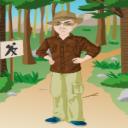Yahoo Answers is shutting down on May 4th, 2021 (Eastern Time) and beginning April 20th, 2021 (Eastern Time) the Yahoo Answers website will be in read-only mode. There will be no changes to other Yahoo properties or services, or your Yahoo account. You can find more information about the Yahoo Answers shutdown and how to download your data on this help page.
Trending News
During Global Warming, as ice melts, hugh amounts of weight are being redistributed onto the Earth's surf?
Surface? Can this be calculated? (estimated?) What effect will this have on Plate Tectonics. Are we heading for a period of increased earthquake and volcano activity?
I ask this here because I'm looking for answers along the redistribution of weight study. Is anybody studying this? If so, what's the latest.
As the plates shift, couldn't a few holes ripped in the surface send us right back into a mini ice age?
4 Answers
- ?Lv 78 years agoFavorite Answer
Yes, the continental shelf under major ice sheets is depressed because of the weight of the ice.
This happens in both Greenland and Antarctica, and if the ice were to suddenly all disappear the land on those continents would uplift by hundreds of meters.
Even in the worst global warming scenario, the disappearance of those ice sheets takes centuries or millenia. Also, the seismic activity is mostly "local". The ongoing activity is studied by geologists.
- mahlonLv 68 years ago
The weight isn't being redistributed as the ice, whether in the form of ice or water, is the same. The changes are in:
> the volume of water (as ice melts, it actually expands),
> the temperature of the water (as the ice melts temperature drops), and
> the salinity of the water (as the salinity decreases, the melting point decreases which accelerates melting) .
As the volume increases, water will encroach on coastal areas. As the temperature and salinity levels decrease, so will the temperature of prevailing winds. As those winds become cooler, so will the temperature of the planet.
Source(s): Reading research - SpartanCanuckLv 78 years ago
The effect it would have is called isostatic rebound, mostly in Greenland, the Canadian Arctic (which is actually still undergoing uplift from the termination of the last glacial maximum) and Antarctica. This could have a subtle effect upon earthquake activity in those parts of the world.
- AnonLv 78 years ago
The difference in weight is negligible.
But the sea level will rise and our weather will go haywire.
It is already happening.
Source(s): Straight fact.





